#Budget2017 a mixed bag for the marketing and communications industry.
Submitted by: MyPressportal Team
On February 22nd, Minister of Finance Mr Pravin Gordhan delivered his annual budget speech and whilst it was welcomed within many sectors including our own, there are some areas of concern. Once again, the much hyped and anticipated increase in Value Added Tax (VAT) did not materialise which was good news. However with State debt creeping up and economic indicators and fiscal numbers weaker than in last year's budget, we continue operating in a less than ideal economic climate.
According to Mr. Gordhan, we are not headed for a recession in 2017, however he states clearly that we are not growing or transforming the economy fast enough. While growth is important, it also often brings with it a higher inflationary and interest rate environment. The last reported CPI figure - January 2017 came in at 6,6% y/y (Stats SA) - remains outside of the Reserve Bank’s targeted inflation band of 3-6%. The risk therefore remains that we may see increased interest rates coming through in 2017.
“Considering the broad economic outlook, it would appear yet again that consumers continue to be burdened with less disposable income. Because of needs and desires, consumers will continue purchasing products, however they will ‘trade down’. Substitute products will become a major threat to brand owners, which will have to be seriously considered and factored into marketing strategies going forward,” says Odette van der Haar, CEO at the ACA.
During difficult trading conditions products and brands enter into price wars resulting in less brand/product loyalty. Numerous product manufacturers also avoid price increases, opting to repackage their offering with a reduction in size, quantity or volume within the FMCG space for personal care and confectionary as well as sweet snacks and beverages. Unfortunately, price parity becomes a driving force to ensure product survival and sustained market share.
Petrol prices are set to increase by 39 cents per litre which affects the costs of all consumables as well as consumers’ transport costs. Sin taxes were hiked yet again. These are imposed with the dual purpose of increasing government revenues and discouraging the consumption of affected products. International studies show that sin taxes have a negative effect on overall consumption, with a recent study in the US drawing a direct correlation between increased taxes and reduced overall consumption (Source: smartasset (2016)). Further derailing the growth targets of brand owners.
Added to this, Mr. Gordhan announced that brand owners are faced with a health promotion levy on sugary beverages. The tax levied will be 2.1 cents per gram of sugar content above 4g per 100 ml and will be implemented in 2017 as soon as legislative amendments have been promulgated. While the overall effects on consumption within the local economy as a result of the tax cannot be predicted at this time, we can predict that consumption will show a level of decline.
“The need for greater collaboration between marketers and their agency partners has always been paramount in ensuring effective marketing and communications campaigns. The critical nature of this is heightened at times such as these and reminds us that marketing spend should not be reduced during difficult periods, but rather increased so as to ensure visibility and retain brand loyalty,’ notes van der Haar.
“The ACA welcomes the recent Preferential Procurement Regulations, 2017 gazetted in January which stipulates that where government awards large firms tenders of R30m or more, 30% of the value of the contract must go to EME and QSE black-owned South African companies. This is momentous news for black-owned agencies in the sector, and the broader transformation process the ACA has embarked upon through its Project Vuselela campaign. This is an opportunity for all agencies to realise the importance of ensuring that their respective organisations are in line with the MAC Charter which comes into full effect in April 2018”, said van der Haar.
“We are continually faced with challenges and less than ideal economic conditions it would seem, however forward thinking organisations adapt, change and take action. We need to ensure that our sector remains a critical, strategic partner to the broader business world, irrespective of trading conditions. This through the development of effective communications campaigns that deliver a defined and measured return on investment for their clients,” concludes van der Haar.
Latest from
- Hyprop Brings the Magic of Disney to South Africa This Festive Season
- The Epic Finale of Tropika Island of Treasure Zanzibar Season 11 - Who Will Claim the Grand Prize?
- Could Sport Be the Key to Shaping a Better Society?
- Johnson & Johnson Marks New Era as Global Healthcare Company with Updated Visual Identity
- European Federation of Journalists to Stop Posting Content on X

